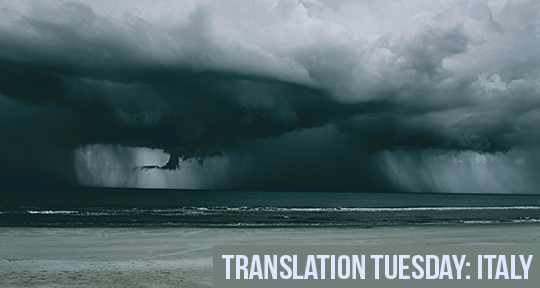For this week’s Translation Tuesday, we bring you a story of the calm before the storm. Picture the sky moments before a fierce downpour: dark, oppressive, hanging over your head like a threat. This excerpt, taken from Italian writer Giuseppe Zucco‘s novel Lord of the Waters, imagines a life suspended in that moment, where the rain never comes. As the external world slows to a standstill, one family’s internal world begins to change. Freed from the obligations of social conventions, work, and school, they quickly descend into a chaotic, easy existence of games, junk food, and neglect, rewriting their familiar dynamics. Beneath their frantic cheerfulness is a persistent anxiety, as they wonder when the amassed rain will finally hit. Translator Antonella Lettieri smoothly captures these currents, refracted through the child narrator’s unaffected voice.
Amongst all the children, I was the first to look up at the sky and see it rear up. I didn’t quite see but rather felt a vast wave soar above me.
I ducked immediately, covered my head with my arms, and, thus crouching, prayed that that wave would not pull me under and wreck me upon the lamp posts and the buildings.
As I closed my eyes, I tried to picture my mother and father, hoping it would help me muster up some courage. All I could see, though, was that gurgling scene, which yet had a certain cheerfulness to it: all the other children and I doing mad somersaults inside the roiling heart of a wave fallen from the sky, our little heads bobbing atop the horrific crests of that brilliant white foam.
My sorrow lasted a second or two; then, since no water came upon us and no dreadful flood crashed down on my head, I opened my eyes again.


